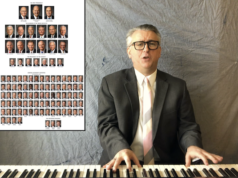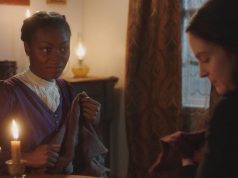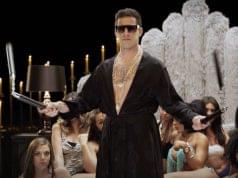“The Work and the Story” poses an interesting question: If Richard Dutcher, founder of the Mormon cinema movement, disappeared, what would become of the movement? The answer: A lot of bad filmmakers would come out of the woodworks, and they’d make crap like “The Work and the Story.”
This is that rare film that deftly (though unintentionally) comments on itself. Its fiction is that Dutcher is missing and presumed dead, leaving wannabes to create new films for Mormon audiences. Alas, most of the wannabes are clueless, and the films are bad.
In the real world, Dutcher HAS disappeared from the movie scene (though he is alive and well), not having made a film since 2001’s “Brigham City.” And in his absence, sure enough, the market has been flooded with films ranging from the OK (“Out of Step,” “Charly”) to the bad (“The Singles Ward,” “Handcart”).
Among the bad is “The Work and the Story,” a faux-documentary that wants desperately to be as funny as its fellow mockumentaries — “This is Spinal Tap” and “Waiting for Guffman,” for example — but that misses some of the crucial elements.
Chief among the problems is that the writer/director, Nathan Smith Jones, casts himself as Peter Beuhmann, the primary wannabe who hopes to fill Dutcher’s shoes. Jones may have skills, but they are not in comedic acting. In his hands, Peter is such a grating character, so over-the-top and one-note, that he drastically reduces the film’s watchability.
Most of the time, the acting — from Jones’ co-stars, too — SEEMS like acting. It rarely feels candid and natural like a documentary would. When the actors improvise, it is uncomfortably obvious they are improvising. When they are reciting prepared dialogue, it is embarrassingly obvious they are reciting.
All of this is critical for a movie that must look and feel like a documentary — like non-fiction, straight from life — if it’s going to work. Yeah, it’s funny on paper when Mormon housewife Judy (Jen Hoskins) mentions that she named her sons after Book of Mormon “prophets” while she was inactive in the church, and that the names she chose were Laman and Lemuel. But in practice, I don’t buy for a second that Judy is speaking extemporaneously. It sounds instead like Jen Hoskins was given dialogue to read, or at least an idea to express, and that she did it, self-consciously and unnaturally. I’m hearing an actress, not a character.
There are a few amusing moments and some clever ideas, though. Peter’s Salieri-like jealousy of Dutcher’s work is noteworthy, and I like the idea of Peter being so controlling as a director that he even directs the outtakes that will run over his film’s credits. (“No, you’re not messing up right!”)
Best of all is Eric Artell as Kevin Evans, a young man whose mother disapproves of movies as a whole. His short films (short, as in seven or eight seconds long) are brief bursts of fresh air, and his Book of Mormon war movie — shot with eggs and stop-motion photography rather than people, to avoid the graphic violence — is nearly genius. It is definitely the best scene in “The Work and the Story,” and I won’t be surprised if it’s better than the upcoming “Book of Mormon Movie” as a whole.
Some more judicious editing would have been beneficial. Several jokes are ruined by running longer than they should. The first that comes to mind is Kirby Heyborne’s (“The R.M.”) speech comparing his strict father to working for Peter. Cut him off sooner and you’d have a great monologue. Same with the aforementioned filming of Peter’s outtakes. Give us a couple takes, then move on. Don’t beat that joke to death.
The lesson here is that just because you CAN make a film doesn’t mean you should. It is not as easy as it apparently looks. Improvising isn’t less difficult just because it doesn’t involve line memorization; some actual skills are necessary, too. This movie needed better actors and a better script (or a more thorough outline). It is, unfortunately, just another reminder of how much we miss Richard Dutcher. Nathan Smith Jones realized Dutcher’s work would result in many bad filmmakers coming into the market; he probably didn’t realize he would be one of them.
D+ (1 hr., 5 min.; )





